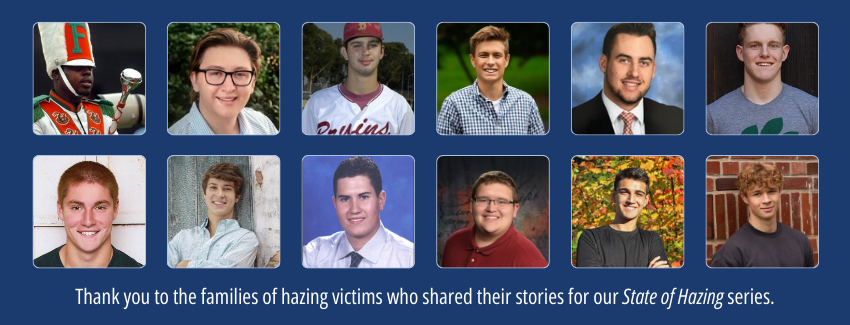73 hazing incidents since 2018: The state of hazing in New Jersey
Just half of New Jersey’s colleges and universities are publicly disclosing campus hazing incidents as required by state law, a HazingInfo investigation finds
.png?width=1600&height=250&name=SOH%20Banner%20and%20text%20bugs%20-%20HI%20Blog%202025%20(1600%20x%20250%20px).png)
Editor’s note: This is part of our blog series, “The State of Hazing,” investigating the impact of hazing laws in nine states that require public disclosure of hazing incidents.
Only about half of New Jersey’s colleges and universities are complying with the state’s 4-year-old hazing transparency law by publicly disclosing hazing incidents on their websites.
That is a key finding from a new investigation by HazingInfo.org that also found 73 hazing incidents reported by 16 higher education institutions in New Jersey since 2018.
Experts say that’s a fraction of the actual number of hazing cases and that New Jersey and other states need to do more to increase hazing transparency and accountability.
 “We had hoped with increased penalties that it would discourage hazing nationally and in New Jersey,” said Kip Bateman, a former New Jersey state senator who sponsored the state’s law passed in 2021. “I was pleased when the governor signed it, hoping it would save lives, and I think it has. But unfortunately, we’re not where we should be.”
“We had hoped with increased penalties that it would discourage hazing nationally and in New Jersey,” said Kip Bateman, a former New Jersey state senator who sponsored the state’s law passed in 2021. “I was pleased when the governor signed it, hoping it would save lives, and I think it has. But unfortunately, we’re not where we should be.”
Bateman said he is concerned about New Jersey schools not reporting as required. “We probably should have included a penalty” for non-compliance, he said
“The law is the law, whether you have fraternities or not. It’s very easy to put into place the infrastructure needed” to report hazing cases, he said.
Rutgers University has the largest number of reported hazing cases
New Jersey is currently one of nine US states with laws or policies requiring campuses to post their hazing incidents online.
Across those states, the HazingInfo.org investigation found 946 reported incidents of hazing on 171 campuses between 2018 and February 2025. This is the first time the total number of reported US hazing incidents has been tallied.
New Jersey college hazing data, 2018 to February 2025
.png?width=1545&height=2000&name=New%20Jersey%20(1).png)
New Jersey’s 73 reported hazing incidents include 28 cases reported at Rutgers University-New Brunswick (the state’s largest school); nine incidents at Princeton University; and six incidents at the College of New Jersey.
Rutgers did not respond to multiple requests for comment.
The HazingInfo investigation only included misconduct that each institution formally determined to be hazing. It omitted other kinds of misconduct like alcohol violations or assaults that weren’t officially labeled as hazing.
Twenty-five out of 30 New Jersey institutions have a hazing policy, as required by state law, while just 18 campuses provide an online reporting form for students and others to report hazing.
“You have to have consequences”
 “I’m surprised even 50% of schools are complying with the law. If you don’t hold their feet to the fire, they aren’t going to do it,” said Gary DeVercelly. “The universities are a big part of the problem.”
“I’m surprised even 50% of schools are complying with the law. If you don’t hold their feet to the fire, they aren’t going to do it,” said Gary DeVercelly. “The universities are a big part of the problem.”
DeVercelly and his wife, Julie, lost their son, Gary Jr., in a 2007 hazing incident at Phi Kappa Tau fraternity at Rider University in New Jersey.
Colleges and universities “want to sweep it under the rug … and create an image that campuses are safer than they actually are,” Gary DeVercelly said. “They are financially motivated to protect the fraternities.”
The DeVercellys spent 10 years working to pass the Stop Campus Hazing Act. This new federal law requires all US colleges and universities to disclose hazing incidents on their websites by Dec. 23, 2025, and it includes financial penalties for campuses that don’t comply with the reporting requirements.
They believe the national law will prove more enduring and enforceable than the patchwork of state laws that currently address hazing and hazing prevention.
“You have to have consequences,” Julie DeVercelly said. “You have to have people who are trained, … a site that collects all the data, a review and audit process.”
And most importantly, the national law includes education about hazing and hazing prevention, requiring schools to implement an evidence-based hazing prevention program.
“Without a universal definition of hazing and ongoing, research-based education and prevention programs for all stakeholders, I don’t know how you can expect institutions to report because they may not know what they’re looking for,” she said.
New Jersey law named after Timothy Piazza
New Jersey’s hazing transparency law is named after a different student, Timothy J. Piazza.
He was a Pennsylvania State University sophomore who died in 2017 after being hazed during a Beta Theta Pi fraternity pledging event.
His parents, Evelyn and Jim Piazza, live in New Jersey and worked with Bateman and others to pass the New Jersey law. It is similar to another state law they helped pass in Pennsylvania, also named after Tim. The couple also founded the Timothy J. Piazza Memorial Foundation.
“I’m sure there are way more incidents in New Jersey, definitely at Rutgers,” Evelyn Piazza said. “It was a check-the-box kind of school.”
Piazza has been active in hazing prevention and awareness nationally, sharing her son’s story on scores of US college campuses.
She has been disappointed that only a handful of New Jersey schools have asked her to make anti-hazing presentations on their campuses.
New Jersey has a lot of smaller schools, and Piazza speculated that some may not have the staff to create the hazing incident reports. Still, most campuses already collect the data, so it’s just a matter of putting the information online, she said.
“Who in a state makes sure that people are complying with the law, and what are the repercussions? I’m not sure what to do with that,” Piazza said.
Gary DeVercelly Jr’s story leaves a lasting legacy at Rider
 At Rider University, it’s been 18 years since Gary DeVercelly Jr. died on campus, but his story remains a powerful driver of the school’s hazing prevention programming, said Kadi Diallo, director of student involvement and first year programs.
At Rider University, it’s been 18 years since Gary DeVercelly Jr. died on campus, but his story remains a powerful driver of the school’s hazing prevention programming, said Kadi Diallo, director of student involvement and first year programs.
“It hits differently when it’s closer to home,” she said. “Keeping that story going and using it to educate students plays a big part in why we have had success” in hazing prevention.
Rider University has a published hazing transparency report that shows four hazing incidents since 2018. That includes incidents from a second report published separately for organizations that are no longer recognized by the university.
However, the main report is four years out of date, with no updates since 2021. Diallo said the university plans to update it again once they have more guidance about reporting requirements in the new federal law.
Rider’s hazing prevention strategy relies on extensive required training at the start of each semester for Greek organization leaders, new member educators, and club and team leaders, Diallo said.
Organization advisers also receive education and tools on hazing prevention, she said, and all students joining a club, team, or organization also participate in online hazing prevention education. The school also just offered a hazing training course to Rider faculty and staff.
Rider also prioritizes building individual relationships with students to ensure they feel comfortable reporting hazing if they see it.
The message: “See something and say something, but know that you are supported throughout the process,” Diallo said.
____________________
Learn about hazing on your campus: HazingInfo's Campus Lookup
Read more in our series about the State of Hazing in Georgia, Louisiana, Pennsylvania, Ohio, South Carolina, Texas, Virginia, and Washington.




